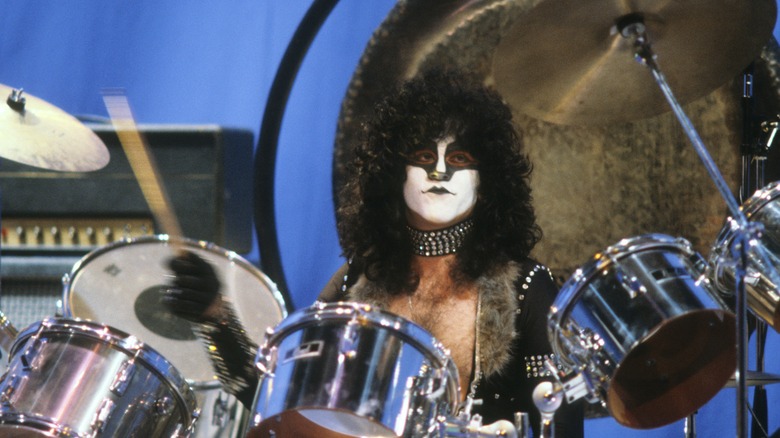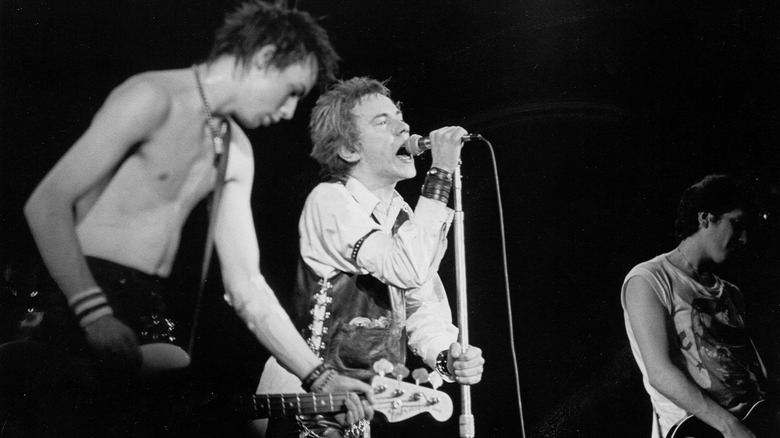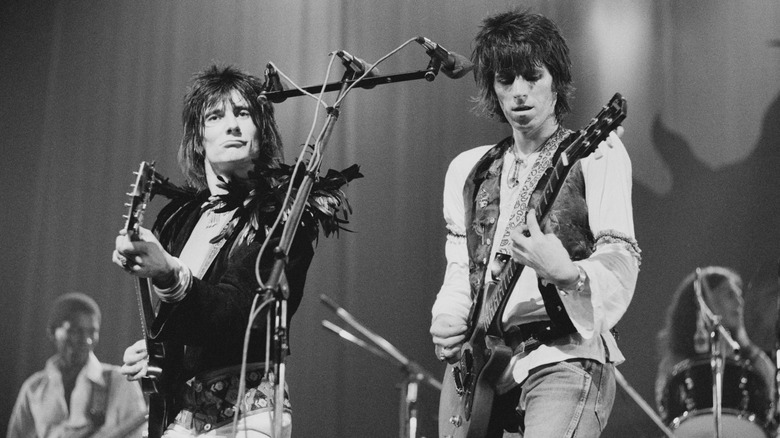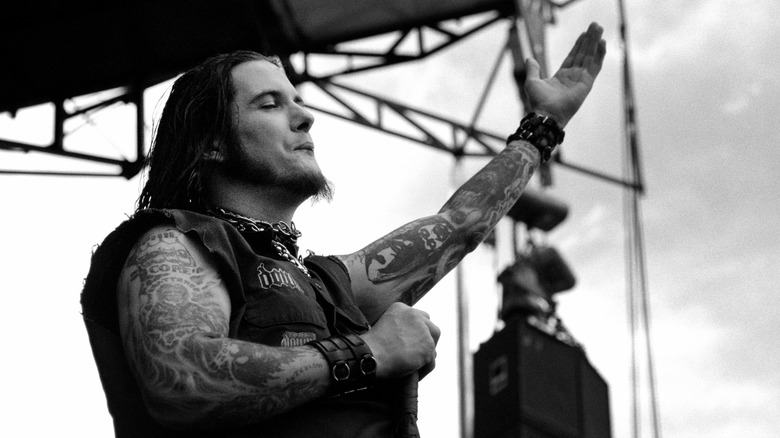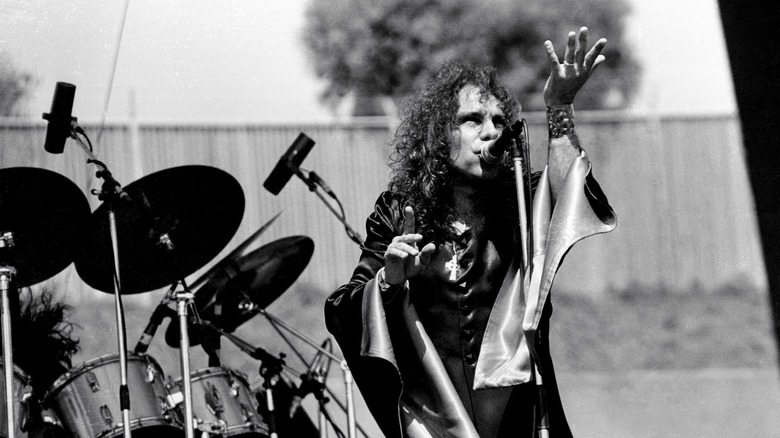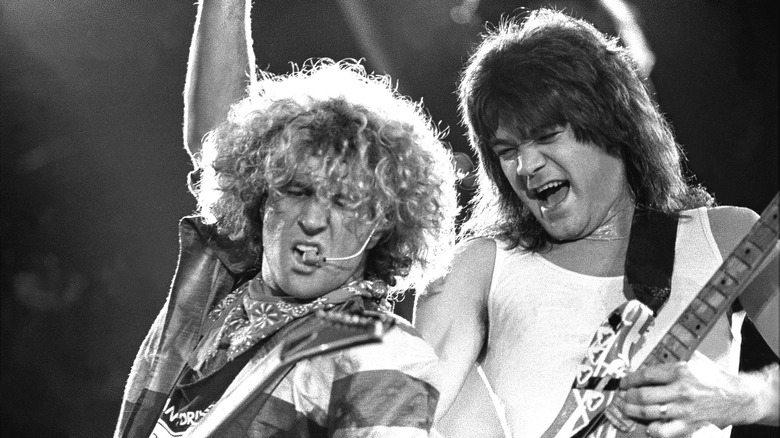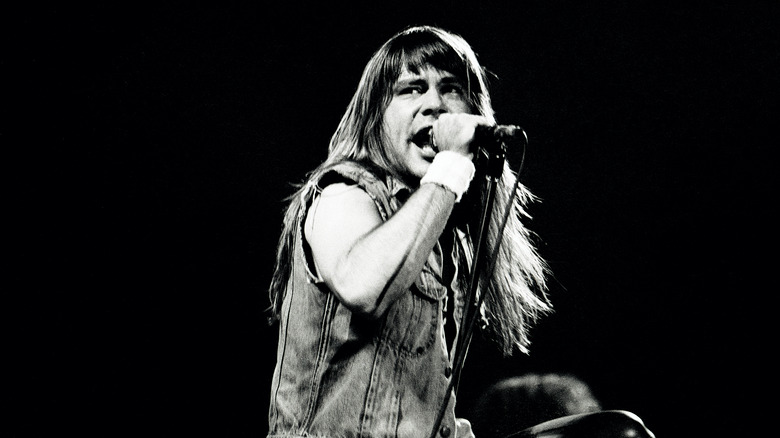The Most Successful Band Member Replacements Ever
Lineup changes are sometimes a necessary thing that nobody — from the remaining band members to the fans — looks forward to. It's like recasting a role on a TV show that's been running for five seasons. Some fans will only ever accept the original and have no qualms about showing it. Even the new guys that work out are doomed to be endlessly compared to the member they replaced, making it difficult to establish their own identity in a group they had nothing to do with forming.
But every so often, a new hire will shock everyone by not only having what it takes to do the job and fitting in with the other members, but by bringing new energy and style to the group that elevates them to new levels entirely. In the best of cases, they do such a great job that they become fan favorites themselves. So who are the best rock lineup fillers? From Eric Carr to William DuVall to Ronnie James Dio and more, these are the most successful band members replacements ever.
William DuVall replaces Layne Staley in Alice In Chains
Tortured Seattle native Layne Staley, armed with one of rock history's most hauntingly beautiful voices, might just be the greatest lead singer of the '90s. Sadly, the Alice In Chains legend overdosed in 2002, according to the New York Times, joining other grunge rock legends in early death. His passing was nonetheless a tragic blow felt across the music world.
Still, Alice In Chains soldiered on with its remaining members, with guitarist-slash-songwriter Jerry Cantrell stepping into the role of creative leader. Cantrell can definitely sing, but he opted to split vocal duties with longtime friend, Comes With The Fall vocalist William DuVall. Clearly, filling Staley's shoes would be no easy task, with DuVall saying to Kerrang, "There was an incredible amount of internal pressure inherent to the situation. Couple that with all the external noise around us, particularly at that time, from 2006. It was unbelievable."
Cantrell concurred, telling Loudersound, "We knew that what [William] was going to have to go through was really tough — stepping into a band that has a history ... I thought he could do it and he proved me right. He's a big reason why we could move forward." It was impossible to avoid fan skepticism, but Duvall was the real deal. Anyone who doubts his abilities should listen to his work on "Your Decision" and "Black Gives Way To Blue," from the band's 2009 album of the same name.
If you or anyone you know is struggling with addiction issues, help is available. Visit the Substance Abuse and Mental Health Services Administration website or contact SAMHSA's National Helpline at 1-800-662-HELP (4357).
Eric Carr replaces Peter Criss in KISS
KISS — the makeup-covered New York fourpiece responsible for such rock radio staples as "Rock And Roll All Night," "Love Gun," "Detroit Rock City," and even the disco song "I Was Made For Loving You," was a massive act in the latter half of the 1970s. But there were signs of wear and tear by the end of the decade. Drummer Peter Criss felt it too. According to Ultimate Classic Rock, Criss, who's stage persona was "Catman," says he quit in 1980. Co-frontmen Gene Simmons (bass) and Paul Stanley (rhythm guitar) maintain he was fired. Pretty typical bandmate squabbling.
But the reason we're all here is Eric Carr. Another UCR article claims he played his first show with the group at the Palladium in his (and the band's) native New York City, in July, just months after Criss' departure. Dubbed, "The Fox," Carr and his thunderous, heavy drumming would spend the rest of the decade anchoring KISS' sound as the group navigated a shifting musical landscape. He contributed to some of the band's most popular tunes, like "Lick It Up," "Heaven's On Fire," and "Crazy Nights," which kept KISS relevant throughout the '80s (via Blabbermouth). Tragically, at the young age of 41, Carr died of cancer in 1991. Paul Stanley recently commemorated him on the 29th anniversary of his passing, according to the same article, calling him "a major force both musically and spiritually" and "a gentle soul."
Sid Vicious replaces Glen Matlock in The Sex Pistols
Imagine this job description: you're to replace a musician in an established band. Problem is, you can't really play, and will never get the chance to record music with them. Good luck!
That's essentially the position bassist Sid Vicious found himself in upon replacing departing member Glen Matlock in British punk rock band The Sex Pistols. Matlock, not one for all the media attention the out-of-control punks were getting, per Diffuser, was out of the group by autumn 1977. This left the Pistols without a songwriter. The group's only album, "Never Mind the Bollocks: Here's the Sex Pistols," a landmark release for punk featuring hot single "Anarchy In The UK," had come out mere months earlier. Luckily, the band didn't need to write any more songs: their reputation for chaos and rebellion had been thoroughly established. The music had done its purpose.
The article notes that Vicious' playing wasn't up to par, but he was never hired for his musical talents. He was hired because he had the punk look and attitude down to a T — spiky hair, a snarl, a leather bomber jacket draped on a nearly skeletal frame. So let's summarize: Sid couldn't play his instrument. He never recorded any music with the band. He tragically passed away barely two years into being hired. And for the Sex Pistols, he was perfect. There's something really punk about that.
Ronnie Wood replaces Mick Taylor in The Rolling Stones
It's not easy joining a well-established band, especially when you're replacing a crucial member. But that's the situation Ronnie Wood found himself in in 1975, when the Rolling Stones announced via press release that he would be replacing Mick Taylor as guitarist, alongside Keith Richards (via Ultimate Classic Rock). "It's quite a lot to ask of someone to come and do a big American tour with a band like the Stones, you know?" frontman Mick Jagger said. "I wanted someone that wasn't going to be phased out."
Wood, formerly of The Faces, was up to the task. In fact, he later claimed to have been envisioning himself as a member of the Stones for years, according to the article, describing a 1969 meeting with Mick Jagger and drummer Charlie Watts. "We talk away for a while and then they say, 'Okay, we gotta go and play. We'll see you soon.' And I said, 'Yeah, sooner than you think.' I was always confident I would end up in this band, and a few years later I did."
He had to work hard for the spot, but it paid off, for him and the band. He and Richards have developed a unique, "weaving" style of guitar interplay, according to Rolling Stone. Although Wood missed the band's earliest, most foundational recordings, it's hard to imagine the Stones without Wood and Richards speaking to each other, and us, through their instruments.
John Frusciante replaces multiple members in Red Hot Chili Peppers
Anthony Kiedis has always been the vocalist for California funk rockers Red Hot Chili Peppers. Flea has grooved on the bass since the band's inception, and Chad Smith, who's definitely not Will Ferrell, has manned the drum kit since '88 (per Rolling Stone). But the guitarist's slot has been filled by no fewer than seven players throughout the band's history, according to MTV, including original axeman Hillel Slovak, who tragically passed away in 1988, Dave Navarro, most famous for his work in Jane's Addiction, and Josh Klinghoffer, who shredded the six string on some of group's most recent records.
All were worthy musicians, but for this band at least, one guitarist stands head and shoulders above the rest: John Frusciante. The band's on-again, off-again virtuoso — whom Gigwise says was voted the best guitarist of the last 30 years – has played on the band's three most successful albums, all separated by several years and less noteworthy releases. The list includes their 1991 breakthrough "Blood Sugar Sex Magik," which featured hits like "Under the Bridge" and "Give It Away"; 1999's "Californication," featuring the title track and "Get on Top"; and 2006's double-album "Stadium Arcadium," with fan favorites like "Dani California," "Desecration Smile," and "Snow (Hey Oh)," which features a confoundingly gorgeous opening lick from Frusciante. To the delight of fans, John rejoined the group in late 2019 (via Ultimate Classic Rock), hopefully setting the stage for more great music in the years to come.
Phil Anselmo replaces Terry Glaze in Pantera
What comes to mind when you think of Pantera? If you're familiar with the groove metal fourpiece from Texas that flew the metal flag high throughout the '90s, you probably imagine legendary, late axeman Dimebag Darrell shredding like nobody's business, his brother Vinnie Paul pounding away at the drums in swaggering lock-step with Rex Brown's bass, or frontman Phil Anselmo scowling and digging deep to unearth one of metal's darkest, deepest, most earth-shaking voices. Anselmo's menacing sound and image is so baked into the DNA of Pantera that it's almost impossible to imagine the "Walk," "Cemetary Gates" and "Revolution Is My Name" rockers with anyone else manning the mic.
But Anselmo was actually the group's second singer. Before turning into the brutal headbangers we all love and fear, Pantera were actually a pretty run-of-the-mill glam metal outfit. Original singer Terry Glaze helmed the band through three records in the '80s: 1983's debut "Metal Magic," (via Loudwire), the following year's "Projects in the Jungle," and 1985's "I Am The Night." Don't kick yourself if you haven't heard of these: none were particularly successful.
In 1988, the band released its first record with Anselmo: "Power Metal." But it wasn't until 1990's "Cowboys From Hell" that they truly came into their own as unstoppable metal titans. "There was nobody better than me around, and I knew that, and I knew what they needed," Anselmo remarked to Horns Up Rocks. Given the results, it's hard to argue.
Travis Barker replaces Scott Raynor in Blink-182
SoCal pop punk trio Blink-182 spent the '90s making a name for themselves in rock circles. Tom DeLonge and Mark Hoppus' splitting of lead singer duties was a unique feature, and drummer Scott Raynor could keep a rapid beat on songs like "Dammit" and "Josie" from the group's 1997 hit record, "Dude Ranch." But Blink's ascent wouldn't stop after a handful of rock radio hits: they were destined to conquer the world of pop. And sadly, Raynor wasn't the man for the job. There's a bizarre lack of verifiable facts regarding his departure, but Cheatsheet claims his heavy drinking put him at odds with the other two members. Either way, by 1998, he was old news.
Now the group needed a replacement. Enter then-Aquabats drummer Travis Barker. As legend has it, per Kerrang, Barker agreed to fill in for a few dates. He then proceeded to master the songs in an hour flat and knock the gig out of the park (via Music Radar). By 1999, just in time for the group's smash hit breakthrough record "Enema of the State," he was a full-fledged member. Barker is, of course, still manning the drums for Blink today, and is arguably its most famous member. His unmatchable skills have also made him one of the most in-demand drummers in music, contributing his talents to everyone from Yelawolf to Steve Aoki to Machine Gun Kelly (via Billboard). Rolling Stone even listed him as one of the greatest drummers of all time.
If you or anyone you know is struggling with addiction issues, help is available. Visit the Substance Abuse and Mental Health Services Administration website or contact SAMHSA's National Helpline at 1-800-662-HELP (4357).
Ronnie James Dio replaces Ozzy in Black Sabbath
With Black Sabbath, Ozzy Osbourne helped invent heavy metal, according to Rolling Stone. Other bands might've contributed to the genre's style and attitude, and obviously development of the sound didn't stop with them. But Sabbath provided the foundational blueprint that eventually made everyone from Iron Maiden to Metallica to Pantera to Slipknot possible.
So when Osbourne was fired from the group in the summer of 1979, they had two choices: call it a day, or try to replace the iconic Prince of Darkness. They chose the latter option, and it's a good thing they did: replacement singer Ronnie James Dio saved the band heading into the '80s, according to Loudersound. "Ronnie came over, we played 'Children of the Sea,' this blues song we were doing, and we thought, 'Bloody hell!'" said bassist Geezer Butler. "We'd been sitting there for six months with absolutely nothing, and Ronnie comes in and just nails it straight away."
The album that song was on, "Heaven and Hell," went platinum (via Discogs). Fans ended up loving Dio's mighty vocals so much that he later formed a band, also called Heaven and Hell, with Butler, Tony Iommi, and drummer Vinnie Appice. The band lasted from 2006 until Dio's tragic passing from stomach cancer in 2010 (via Rolling Stone). According to Spin, Dio's funeral was attended by thousands of fans. The upper echelons of heavy metal royalty also came to pay respect to the beloved "Little Man With the Big Voice."
Sammy Hagar replaces David Lee Roth in Van Halen
With David Lee Roth at the mic and Eddie Van Halen on guitar, Van Halen took the rock world by storm starting with their eponymous 1978 debut, "Van Halen." Diamond Dave, leaping and hollering across the stage in bright colors, was one of the most entertaining frontmen ever. Eddie was almost certainly the most important rock guitarist since Jimi Hendrix. But as the Washington Post notes, clashing egos and incompatible creative visions eventually led to Roth's 1985 departure.
It seemed like the end of an era. And it was, but for Van Halen, it was also the beginning of something fresh and just as successful. They hired "Red Rocker" Sammy Hagar, formerly of Montrose, to replace Roth (via Loudersound). Hagar wasn't quite the showman Roth was, but he wasn't lacking in that department either. He could play instruments himself, but where he truly shined was his raw vocal abilities. "Oh man, this guy can sing!" Hagar later remarked, referring to the band's reaction to his audition. Their first album together, "5150," was a smash hit. And according to Music Nerd, their success didn't stop there: during the Hagar era, Van Halen had nine Top 40 hits, versus seven under Roth. And while fans will always love Roth, the original who produced the band's two best selling records, "Van Halen" and "1984," they've come to love Hagar as well: the man who saved the band at its lowest point.
Brian Johnson replaces Bon Scott in AC/DC
Australian hard rock quintet AC/DC was one of the hardest working bands in the business in the late '70s. Their simple beats were complimented perfectly by duckwalking, schoolboy-uniform-wearing Angus Young's guitar riffing and the distinctive raspy vocals of frontman Bon Scott. They were just starting to make a name for themselves when Scott tragically died after a night of binge drinking in February 1980 (per Ultimate Classic Rock). Said Young, "For us, it was like losing a member of your family ... Not only is it your friend, it's also somebody you've been working with all that time."
The band mourned, but they didn't hang up the guitars. Instead, months later, they brought in Geordie singer Brian Johnson (via Revolver). Swapping out frontmen is a risky move, but Johnson was no mere replacement. He and his inimitable voice was the band's ticket to new heights of commercial success.
Revolver points out that 1979's "Highway To Hell" was by far the band's highest charting record, peaking at No. 17 on the Billboard charts. But "Back In Black," the group's first with Johnson, was a smash, blockbuster hit on another level entirely. The title track, "You Shook Me All Night Long," and "Hell's Bells" are still some of the most beloved headbanging tunes in history. Today, it's the single highest selling rock record ever, per Guitar World. Johnson, now a beloved member of the group, is still bringing down the house with AC/DC today.
If you or anyone you know is struggling with addiction issues, help is available. Visit the Substance Abuse and Mental Health Services Administration website or contact SAMHSA's National Helpline at 1-800-662-HELP (4357).
Bruce Dickinson replaces Paul Di'Anno in Iron Maiden
Paul Di'Anno infused Iron Maiden's new wave of British heavy metal sensibilities with the more grounded fury of punk rock, leading to two solid early records: "Iron Maiden" and "Killers." "We knew that what we had was unique compared to every other band around," Di'Anno told Classic Rock, in an interview excerpted in Loudersound. "The only person who might have had any doubts was me. Though I was a cocky frontman, I was all mouth and no trousers." Di'Anno is clearly a good sport. He also wasn't exactly wrong – Maiden's sound was simply too big for the limited range and personality he could provide. He later says, "I don't blame them for getting rid of me."
On October 26, 1981, another Loudwire article says, Di'Anno's replacement, Bruce Dickinson, played his first show with the band. Originally known as "Bruce Bruce" with the band Samson, where Maiden discovered him, Dickinson switched his name to something a little less goofy after being hired. Then he donned some leather and studs, and he proceeded to propel Maiden to dizzying new heights of classic heavy metal glory with his supreme, untouchable operatic voice. Rolling Stone listed their first album together, 1982's "Number of the Beast," as the fourth greatest metal album of all time. There's a reason for that: songs like the title track and "Run to the Hills" rank among metal's most beloved tunes, thanks to an untouchable frontman truly worthy of Iron Maiden's enormous vision.


